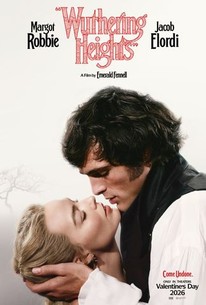Wuthering Heights is a gritty, wild, and incredibly seductive historical novel like nothing you’ve ever seen.

Review
Emerald Fennell’s Wuthering Heights isn’t a book adaptation—it’s a fever dream drenched in lust, longing, and moorland fog. Fennell, best known for the razor-sharp thrillers Promising Young Woman and Saltburn, directs, writes, and produces this version with Margot Robbie and Jacob Elordi at the vortex of its storm.
Rewriting the Gothic Canon
From the trailer, we know this isn’t Jane Eyre in disguise—this is Wuthering Heights stripped of Victorian hushed tones and injected with modern heat. Robbie’s Catherine and Elordi’s Heathcliff are propelled not just by dark love, but by raw physicality. Vogue quips about the trailer’s imagery: “hands kneading bread… set to ‘Everything Is Romantic’ by Charli XCX!”. And yes—corsets, whips, and egg yolks share frame-time with the moors.
The film opens already in a maelstrom. In Dallas test screenings, audiences called it “aggressively provocative” and “tonally abrasive,” noting early scenes like a graphic public execution and unsettling close-ups that feel ripped from Saltburn’s playbook.
The Romantic Maelstrom
This isn’t a faithful retelling—it’s gothic lit reimagined by a director who famously says, just a book. Casting director Kharmel Cochrane emphasized this, noting that artistic license trumps lit-major accuracy. That freedom bleeds into every frame: Robbie and Elordi aren’t symbols of romantic repression but avatars of erotic deconstruction—Catherine not merely torn by duty, but yearning, dangerous, alive.
Robbie’s Catherine is a torn live wire—wrenching desire from across the moor, defiant yet wounded. Elordi’s Heathcliff is a storm incarnate—volatile, magnetic, and heartbreakingly miscast only if one pits this version against traditional race expectations. Critics called out that Heathcliff, described in the novel as dark-skinned and outsider, has been whitewashed. At the same time, some fans argue Fennell reinvents the story instead of reenacting it.
A Film That Dares
In an era of sanitized period pieces, Fennell’s Wuthering Heights rages. Cosmopolitan captures it: “The new adaptation… explicitly sexual… corsets, whips, overt sensuality”. And The Guardian calls it “aggressively provocative,” highlighting its stark aesthetic shifts.
The lead trio—Robbie, Elordi, Hong Chau, Alison Oliver—creates a charged atmosphere. Robbie herself described the film as “bananas… brilliant,” while Elordi called Robbie a “livewire,” explaining he almost stepped away from acting until Fennell cast him.
Lights, Camera, Emotion
Behind the lens: Linus Sandgren, weaving romantic dread into every misty moor and candlelit chamber. The soundtrack blends delicate score by Anthony Willis with raw pop from Charli XCX. Together, sound and sight evoke the novel’s destructiveness with stylized, pulsing elegance.
Polarization & Provocation
Audiences are split. For every fan crying brilliance, another sees sacrilege. One Redditor laments reliance on “shock factor over storytelling”. Yet others—especially those craving reinvention—hail it as a modern masterpiece.
This polarization is Fennell’s design. She isn’t just retelling Brontë—she’s reframing obsession through a 21st-century lens, rife with erotic liberation and emotional carnage.
The Verdict
If you’ve ever wondered what a Gothic romance would feel like if it were drowned in neon desire and brimmed with brazen intensity, this Wuthering Heights is for you. It’s not a balm—it’s a blister. But for those drawn to stories that crackle, bleed, and argue with you long after credits roll, this adaptation is an electrifying, divisive triumph.
Critical Voices
-
The Guardian: Calls the film “aggressively provocative” with “tonally abrasive” visuals.
-
Cosmopolitan: Notes the film’s “explicitly sexual… corsets, whips, overt sensuality”.
-
Cinemablend: Highlights backlash over whitewashing but points to possible reinterpretation intent.
-
Casting Director Kharmel Cochrane: “It’s just a book… it’s all art.”
Attribute Details Genre Gothic Romantic Drama / Erotic Period Piece Release Year 2026 (Valentine’s Day, February 13) Director / Screenwriter Emerald Fennell Producers Emerald Fennell, Margot Robbie, Josey McNamara Starring Margot Robbie (Catherine Earnshaw), Jacob Elordi (Heathcliff), Hong Chau, Shazad Latif, Alison Oliver, Martin Clunes, Ewan Mitchell Music Score by Anthony Willis; original songs by Charli XCX Cinematography Linus Sandgren Production Companies Warner Bros. Pictures, MRC, Lie Still, LuckyChap Entertainment Distributor/Studio Warner Bros. Pictures Budget Reportedly $80 million (Warner Bros won $80M bid after Netflix offered more)